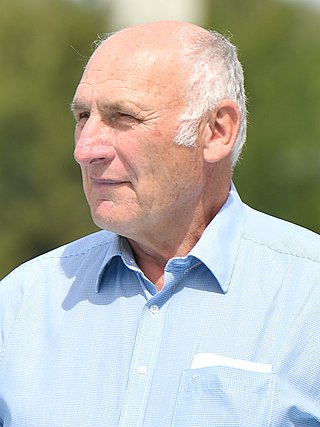Kurt Schmid was a Swiss rower who competed in the 1952 Summer Olympics and in the 1960 Summer Olympics.
Gerd Cintl was a West German rower who competed for the United Team of Germany in the 1960 Summer Olympics.

Igor Aleksandrovich Rudakov is a Russian former coxswain who competed for the Soviet Union in the 1960, 1964, 1968, and in the 1972 Summer Olympics.

Hans-Johann Färber is a German rower who competed for West Germany in the 1968 Summer Olympics, 1972 Summer Olympics and in the 1976 Summer Olympics.
The 1970 World Rowing Championships was the 3rd World Rowing Championships. It was held in 1970 at the Royal Canadian Henley Rowing Course in St. Catharines, Ontario, Canada. The competition involved seven events. Prior to the 4th World Rowing Championships in 1974, only men competed.
The 1974 World Rowing Championships was the fourth World Rowing Championships. It was held from 4 to 8 September 1974 and from 29 August to 1 September 1974 on the Rotsee in Lucerne, Switzerland. The event was significantly extended from the 1970 edition, with the addition of both women's and lightweight men's events. Six women boat classes were added, three lightweight men classes, plus quad scull for men, increasing the number of boat classes from seven in 1970 to seventeen in 1974. This was also the last World Championships held on a quadrennial cycle – from this point, World Championships were held annually.
The 1959 European Rowing Championships were rowing championships held on the Mâcon regatta course on the Saône in Mâcon, France. The event for women was held from 14 to 16 August, and 16 races were held. The event for men was held from 20 to 23 August. Men competed in all seven Olympic boat classes, and women entered in five boat classes.
The 1963 European Rowing Championships for men were rowing championships held on Lake Bagsværd near the Danish capital Copenhagen; the competition for women was held the following month in Moscow. The regatta in Copenhagen was held from 14 to 18 August.
Boris Fyodorov is a Soviet rower. He had a long career, having won international medals between the ages of 22 and 35.
The 1953 European Rowing Championships were rowing championships held on Lake Bagsværd near the Danish capital Copenhagen. Men competed in all seven Olympic boat classes. The regatta was also the third test event for international women's rowing organised by the International Rowing Federation (FISA), with nine countries competing in four boat classes over the shorter race distance of 1,000 m. The purpose of the test event was to see whether women's rowing should formally become part of the FISA-organised European Rowing Championships.
The 1947 European Rowing Championships were rowing championships held on the Rotsee in the Swiss city of Lucerne. The competition was for men only, they competed in all seven Olympic boat classes, and 15 nations participated. It was the first European Rowing Championships held after World War II, and it was the second time that the regatta was held on the Rotsee; the previous regatta was in 1934.

The 1937 European Rowing Championships were rowing championships for men held on the Bosbaan in the Dutch city of Amsterdam. The construction of the Bosbaan was an unemployment project, with the forest planted from 1934 onwards and the rowing lake finished in 1936. The rowers competed in all seven Olympic boat classes.

The 1935 European Rowing Championships were rowing championships for men held on the Berlin-Grünau Regatta Course in the German capital of Berlin. The event was a test run for the rowing part of the 1936 Summer Olympics that were to be held at the same venue. The rowers competed in all seven Olympic boat classes.
The 1931 European Rowing Championships were rowing championships held on the Seine in the French capital city of Paris in the suburb of Suresnes. The competition was for men only and they competed in all seven Olympic boat classes.
The 1933 European Rowing Championships were rowing championships held on the Danube in the Hungarian capital city of Budapest. The competition was for men only and they competed in all seven Olympic boat classes.
The 1927 European Rowing Championships were rowing championships held on Lake Como in the Italian Lombardy region. The competition was for men only and they competed in all seven Olympic boat classes.

The 1929 European Rowing Championships were rowing championships held on the Bydgoszcz Regatta Course in the Polish city of Bydgoszcz in the suburb of Łęgnowo. The competition was for men only and they competed in all seven Olympic boat classes.
The 1925 European Rowing Championships were rowing championships held on the Vltava (Moldau) in the Czechoslovakian capital Prague on 3 and 4 September. The competition was for men only and they competed in all seven Olympic boat classes as they had been rowed at the 1924 Summer Olympics in Paris. It was the first time that the coxless four boat class was part of the regatta.
The 1924 European Rowing Championships were rowing championships held on Lake Zürich in the Swiss city of Zürich. The competition was for men only and they competed in six of the seven Olympic boat classes as they had been rowed earlier in the summer at the 1924 Summer Olympics in Paris; the new Olympic boat class of coxless four (M4-) was also part of the European Rowing Championships, but the only competitor would be Switzerland and they didn't want to win the European championship by row-over. It was the first time that the coxless pair boat class was part of the regatta.
Wilhelm Siegenthaler was a Swiss rower active in the 1920s who rowed for RC Reuss Luzern. He won five European titles.




